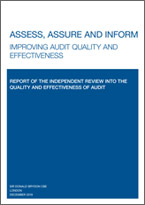 Sir Donald Brydon CBE
Sir Donald Brydon CBE
Sinopse: Language matters. How audit is described influences how it is conducted and how users respond to it. It starts with a clear description (certainly from auditors) that it is for directors to communicate about their company and, within limits, for auditors to confirm what is communicated. Michael Power titled his book in 1997 The Audit Society – Rituals of Verification. The quality and effectiveness of audit has become an increasingly contested issue, with the result that this Review has been commissioned. Some consider that audit is good enough but the starting place of this Report is that it is not.
At a time when information is everywhere and there is no obligation on users of the internet to be truthful, it matters even more that shareholders, and others, can trust what directors are communicating. Auditors have a unique advantage in having the right to see everything that goes on in a company and to assess whether that trust is deserved.
There has been a slow evolution, since the 1970s, in the role of audit from being just a periodic external check on the accuracy of financial reporting towards a value adding function, but this has further to go. In hiding behind the need only to confirm and verify, many auditors have failed to grasp the opportunity to make their reports more informative. Many do take this opportunity in private, communicating well beyond the narrow confines of auditing standards when reporting to audit committees, but not to shareholders or other stakeholders.
